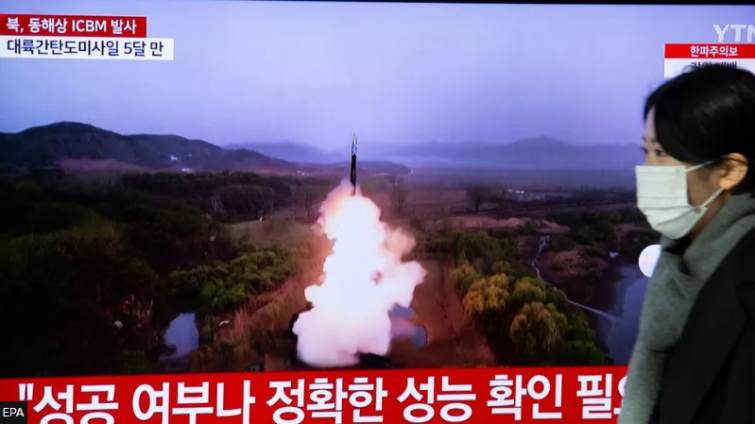North Korea has fired its most advanced long-range missile, South Korean authorities confirm, defying UN curbs.
The launch of the solid-fuel intercontinental ballistic missile drew immediate condemnation from the West. It landed west of Hokkaido in Japan.
It comes after South Korean and US defence officials met last week to update plans on how to respond to a nuclear attack from the North.
Pyongyang had said in response it would take "more offensive countermeasures".
The isolated state launched the long-range missile on Monday morning about 08:24 local time (23:24 Sunday GMT) from the Pyongyang area.
South Korean and Japanese officials said the missile travelled for 73 minutes, covering about 1,000km (621 miles).
ICBMs have the range to reach the North American continent. Monday's launch is North Korea's fifth successful launch of an ICBM this year.
Tensions between the North and the South flared last month when Pyongyang successfully launched a spy satellite into orbit, in violation of United Nations sanctions.
Seoul responded by partially suspending a military agreement with the North that was meant to limit military activity along the border and reduce the likelihood of clashes.
Pyongyang then withdrew from the agreement entirely. North Korea has since rearmed its soldiers in previously unarmed areas of the Demilitarised Zone.
Last week, South Korea's national security advisor Kim Tae-hyo said he was expecting the North to launch an ICBM at some point in December.
On Monday, South Korean national security officials confirmed the ICBM launched was a solid-fuel missile. Such missiles can be fired with less warning, as they do not need to be fuelled prior to launch.
The North had tested its Hwasong-18 missile in July following a first successful flight in April.
North Korea is also working to develop a new solid-fuel medium-range ballistic missile. Last month it claimed to have successfully tested the engine, but the missile had not yet been successfully launched.
As North Korea continues to refine and add to its arsenal of nuclear weapons, South Korea and the United States are stepping up their defence of the region.
In a meeting in Washington on Friday, officials updated their contingency plans for how to respond to a North Korean nuclear attack. The two countries also agreed to war-game the use of nuclear weapons in their military exercises next summer.
Latest Stories
-
Dr. Ayensu-Danquah defends professorship, stating 15 years of teaching surgery
32 minutes -
Access Bank honoured with two prestigious awards at 2025 HESS Awards
51 minutes -
Oti Region to get university within my tenure – Mahama reaffirms pledge
1 hour -
Daughter killed in father’s arson attack over sex denial
3 hours -
NPA Scandal: Four suspects remain in custody after failing to meet bail conditions
4 hours -
NPP to open 2028 flagbearer nominations on July 29
4 hours -
Sam George to open Pan-African AI Summit 2025
5 hours -
NDC opens nominations for Akwatia parliamentary primaries on July 28
5 hours -
Guinness Ghana DJ Awards opened new doors for my career – DJ Pho
6 hours -
Mohammed Sukparu commits to advancing Ghana’s Artificial Intelligence agenda
6 hours -
‘What is coding?’ – Question raises eyebrows during Deputy Communication Minister-nominee’s hearing
6 hours -
WAFCON 2024: Ghana’s Black Queens claim third-place after penalty win over South Africa
6 hours -
Ghana celebrates 100-year-old WWII veteran Joseph Ashitey Hammond
7 hours -
Measures announced in Mid-Year Budget Review fully in line with programme objectives – IMF
7 hours -
This Saturday on Newsfile: AG drops charges in uniBank trial, Aud-General’s report, and Mid-Year Budget Review
7 hours

